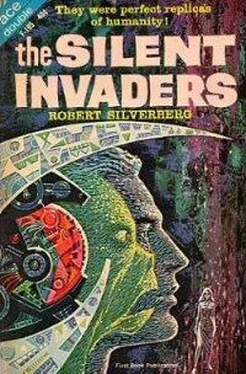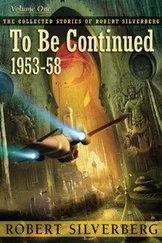“I’m inclined to think they’ll be incapable of shielding against this,” Reynolds said. “It would take technology of an overwhelmingly high order—an inconceivable high order—to work out any defense against a subsonic. The very simplicity of the device makes it impossible to counteract. Shall we test it?”
“We’d better,” Carver said. Reynolds gestured, and Tompkins and Patterson disappeared into one of the other rooms, returning with three cages containing some small Terran mammals. Harris did not recognize any of the species, but none looked to be of any high order of intelligence.
“We’ll go down the hall,” Carver said. “We’ll signal you when we’re out of range, and you see how your subsonic works.”
Harris nodded tightly. The five Darruui left the room. Harris stared at the animals in the cages, and small beady eyes stared back at him, almost seeming to comprehend what he was about to do.
“All right!” Carver called from the distance.
Harris hesitated a moment. Then his hand slipped to his hip, and he pressed inward.
He felt nothing.
But the animals in the cage began to writhe and scream in sudden agony.
The smaller ones suffered least. For them, the pain ended quickly, and they slumped to the floor of their cages, tails twitching for a moment, small feet outstretching rigidly, claws grasping air for a moment and then going stiff.
The larger ones fought the subsonic more sturdily. Then they, too, succumbed, toppling with soft thuds, curling grotesquely into imitations of sleep.
Harris took his hand from his hip. He walked toward the cages, opened one, thrust his fingers in. He touched the small furry cadavers, felt only stiffness and death. Eyes that had been beady a moment before now looked unnaturally glossy as they peered unblinkingly out at him, accusingly.
“Well?” Carver yelled.
“It worked,” he said. “You can come back in now! It’s all over!”
The five Darruui filed back into the room. Reynolds took the animals from the cages and examined them.
“Dead,” he said. “Every one.”
“But it won’t kill human beings?” Harris asked.
“It’ll only stun them,” Reynolds told him. “Even at close range. It’s impossible to design a subsonic that can kill other human beings without killing its carrier in the bargain.”
“And they can’t shield against it?”
“No,” Carver said. “The only way to defend against it is to key the shield to the random cycles, as your shield is keyed. But how can they do that? You can’t fail, Harris. That’s a guarantee.”
One at a time, the six Darruui agents filed out into the streets and scattered. Harris had to walk almost a mile before he emerged from the bleak, deserted warehouse district and found an area civilized enough to have a helitaxi ramp. He reached his hotel shortly before midnight, and, ravenous, ordered a meal sent to his room.
As he undressed for bed, he studied his hip and thigh. There was no sign of anything unusual in either place, he saw. But yet he was equipped very efficiently to stun anyone who came within forty feet of him. If he had been so equipped the other night, Beth Baldwin would be dead by now, and none of this would have happened.
Just as well, he realized. It was only by being captured that he had learned of the true extent of the Medlin operation on Earth. If he had simply killed Beth outright the first night, Darruu would have no hint of the real purpose of the Medlin agents.
He switched off the light.
He slept, but not well.
In the morning, he rode across town to the Medlin headquarters, far to the southeast. Everything was arranged well enough. The helitaxi let him off several blocks from the building, and, as he waited on the crowded corner, he watched the Darruui group assemble.
There was Carver, leaning against a lamppost and reading a newspaper.
Reynolds, gazing into the window of a wineshop diagonally across the street.
McDermott, pacing up and down before a bank and staring at his wristwatch every few minutes.
Patterson, browsing peacefully in a bookstall.
Tompkins, standing by the display of some open-air huckster trying to sell household appliances.
It was all innocent enough. The five of them were well spaced, far from one another. No one could possibly link them. No one could possibly guess that those five were alien creatures in Earther skin.
In turn, each glanced up, looked at him, nodded, then went back to what he was doing. Harris made the Darruui recognition-signal and moved along to carry out his deadly assignment.
It was all so very simple, he thought as he walked up the block to the building that housed the Medlin headquarters. Simply walk in, smile politely, make a little harmless conversation with the Medlins.
Then stun them all with the subsonic, and boil their brains with your disruptor.
He reached the Medlin headquarters building and paused outside it, thinking.
Around him, Earthmen hurried to their jobs. He looked up. The sky was blindingly blue, flecked here and there with white fleece. But behind the peaceful blue of that sky lay the nightblack vault of space, and the burning orbs of the stars.
Many of those stars swore allegiance to Darruu. Others, to Medlin.
Which was right? Which wrong? Neither? Both?
A block away, five fellow Darruui lurked in seeming innocence, ready to come to his aid if he had any trouble in killing the Medlins. But he doubted that he would have trouble, if the subsonic was as effective and as foolproof as Carver seemed to think it would be. It had worked with chilling enough effectiveness on the test animals. But he had learned in the past few days not to underestimate the abilities of the Medlins.
For forty Darruui years, he had been trained to hate the Medlins, root and branch, man and child and babe in the womb; Now, in just a few more minutes, he would be doing what was considered the noblest act a Servant of the Spirit could possibly perform—ridding the universe of a pack of them.
Yet he felt no sense of anticipated glory. His deed would be simply murder, nothing more glamorous than that. The murder of strangers in strange skins.
He entered the building.
He remembered this lobby all too well—the vast concourse, the arching ceiling high overhead, the crowd of Earthmen bustling past. He made his way to one of the Down grav-shafts. The Earthers had run out of space in the upper reaches of their cities, having built a hundred and a hundred fifty stories high and daring to build no higher, and so they burrowed into the ground. This building rose ninety stories into the air, and dropped a hundred more into the sub-city bowels.
He rode down, down, down. The gravshaft’s drop halted, finally. He got out, moved as in a dream down the by-now-familiar corridor toward the Medlin headquarters. It seemed to him that he could feel the pressure of the tiny subsonic generator in his thigh. He knew that it was only an illusion, a trick, but the presence of the metal bead irritated him all the same.
He stood for a moment in a scanner field in front of the Medlins’ door. He expected to be questioned, but no questions came, and in a moment a door flicked back suddenly, out of sight, and a strange face peered at him—an Earthman face, on the surface of things, square-jawed and fleshy and deeply tanned.
The Earthman beckoned him in. Harris stepped through the door and felt it slice shut behind him.
“I’m Armin Moulton,” the Earthman said in a deep voice. He did not put out his hand, nor did Harris offer his. “You’re Major Harris?”
“That’s right.”
“We’re glad you came. Beth is waiting to see you inside.”
The last time he had been here, he had been too dazed, too numbed by the after effects of his stunning, to observe very much. Now he saw that the Medlin offices were capacious and extensive, with rooms going off in all directions. No doubt the cell in which they had kept him for the night was at the end of one of those corridors. The furnishings in the rooms were attractive and not inexpensive.
Читать дальше












